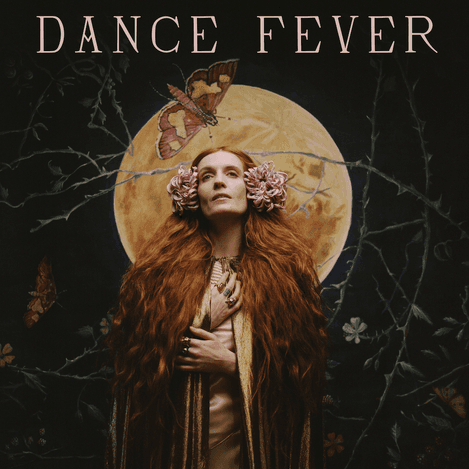Florence + the Machine shake up the formula on the joyous and personal Dance Fever
"Dance Fever"

Choreomania, as the condition was later termed, was recently put to screen in Ari Aster’s 2019 horror film Midsommar, but Florence Welch’s long-standing fixation with the pagan and the bewitched has rarely felt horrific. Instead, all of her references to witchcraft and the occult have felt like pure theatrics – her music colourful and accessible, her wicker made for the Glastonbury main stage rather than their runes. Since her 2009 6x platinum debut Lungs, her presence has remained stubbornly consistent, an anomaly amongst her pop peers who often contorted their sound to the whim of each passing trend.
Indeed, her fifth LP sticks to the same, fruitful ground. There’s a moment on "Cassandra" where she sounds a little like '90s Nick Cave, which is new, and the final track sounds closer to breezy indie pop than she’s ever ventured before; but the album’s singles are still filled with howled choruses, driving drums and plucked harp. Despite this, Dance Fever feels like Welch’s biggest change of course in a decade. Firstly, it boasts some of her strongest singles ever, and, coming at the end of a four year break and a two year pandemic, it’s not the theatrical Welch who shows up here; this is a woman and a songwriter, no forest-sprite.
On the opening "King", Welch is standing in her kitchen arguing with her partner about her career and about motherhood. It’s filled with personal triumph al a "Shake It Out", but also pieces of startling self-doubt: “I was never as good as I always thought I was” she sings in the coda, “but I knew how to dress it up”. On the wonderful "Girls Against God" she makes a mockery of the grandeur which is her music’s defining sound: “Crying into cereal at midnight… I listen to music from 2006 and feel kind of sick / But oh God, you're gonna get it / You’ll be sorry that you messed with this”. Welch has been many things in her music, but funny wasn’t one of them until now.
On Dance Fever, there’s definitely the feeling of an artist whose decided that they have nothing left to hide. On "My Love", the album’s most-likely hit, she talks about losing her creative spark as lockdown began, and wonders where to put her feelings if not in song. The panic of this loss is palpable, and more horrific than any creature of the night. The moment of rediscovering her muse is a jubilant one, as is the closing stretch of the record, which boasts some of the most delicate instrumentation of a band whose career has been marked by bombast.
Closer "Morning Elvis" is the most self-lacerating song Welch has ever recorded; so raw that hearing it feels like pressing a thumb against a bruise. “I told the band to leave without me / I’ll get the next flight / I’ll see you all with Elvis if I don’t survive the night”. The song ends with the kind of explosive finale which made Welch a star, but after lyrics like these, the jubilation feels truly earned. Dance Fever may not be their pivot towards disco, but moments like these make it as thrilling as a night on the dance-floor.
Get the Best Fit take on the week in music direct to your inbox every Friday

Great Grandpa
Patience, Moonbeam

Deafheaven
Lonely People With Power

Perfume Genius
Glory





